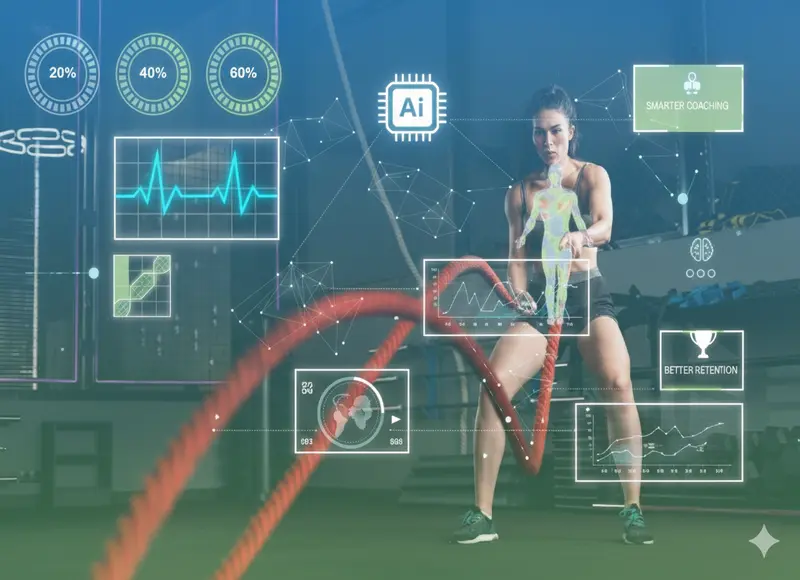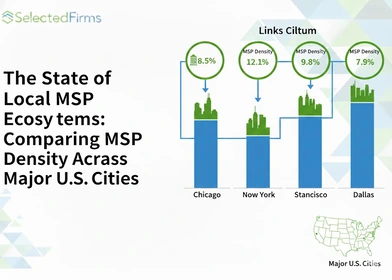Table of Contents
AI is transforming digital fitness by delivering smarter, personalized coaching, adaptive workout plans, and predictive insights that keep users engaged, motivated, and more likely to stick with their fitness journey for the long term.

Artificial intelligence is changing industries globally - and fitness is no different. We now have AI chatbots nudging users to move more, and platforms predicting when users will stop using them. That even reaches fitness apps and smart wearables.
Despite the whirlwind, many digital fitness solutions struggle. 71% of users stop using fitness apps by the end of the third month, and only about 40% of users continue using apps after the first 24 hours.
There it is; the problem is low retention rates, standard programs offered, and weak personalization.
Here is the pitch - AI is not just a nice-to-have. It is a fundamental part that will make digital fitness platforms smarter, more personalized, and much more engaging because it just is the difference between an app users keep or ditch.
The AI Boom in Fitness
In fitness specifically, the stakes couldn't be higher because so many digital fitness solutions deal with a lack of retention and personalization. Users download an app, try a few workouts, and abandon it in a matter of weeks.
The Role of AI in Digital Fitness Solutions
Historically, applications were used for tracking basic metrics like calories, steps, or heart rate. Useful, but static.
AI fitness applications take tracking further by:
- Offering daily, personalized fitness coaching that evolves.
- Making workout recommendations based on performance, recovery, and goals.
- Utilizing predictive insights to help prevent churn.
Rather than a one-size-fits-all approach, AI-powered fitness digital products are built-for-you solutions. A simple comparison:
- Old model: Log your run → receive basic stats.
- AI model: Log your run → app analyzes your pace, sleep, recovery, etc. and then designs your workout for tomorrow, while suggesting adjustments to your nutrition.
Smarter Coaching Through AI
AI is not simply about data - it is about smarter adaptive coaching experiences that feel more human. For example:
- An adaptive workout plan is a plan that can evolve in real-time, based on the user's progress.
- Virtual AI coaches provide encouragement, workout intensity adjustments, and even celebrate milestones.
- Computer vision and motion tracking can be used to identify aberrations from poor form, correct positioning, and reduce the risk of injuries.
Examples: Freeletics programming borderline exclusively utilizes AI to build customized training paths, while Tonal uses machine learning and user input data to automatically adjust resistance and provide feedback.
This greatly shifts digital fitness solutions from passive trackers to active coaching partners.
AI Technology and User Retention in Digital Fitness Sectors
Retention, as it relates to fitness apps, is one of the biggest challenges. Thankfully, they have AI to help:
- Predictive analytics: Understand when a user is about to disengage and trigger automatic interventions (reminders, moderated workouts)
- AI gamification: Create personalized, anticipatory challenges instead of general challenges
- Nudges & reminders: Timing matters. AI learns when users are prone to exercise and pings them at that moment.
Outcome: Users feel seen, supported, and motivated, and stay longer.
Technical Considerations for AI-Powered Digital Fitness Solutions
Behind the scenes, the development of AI-driven digital fitness software takes a significant amount of engineering time.
- Wearables & IoT integration: Data from smart watches, heart-rate straps, or connected gym equipment allows for smarter insights.
- Data privacy & compliance: Protecting health data (HIPAA, GDPR) ensures user data is secure.
- Cloud scale: The real-time personalization requires an infrastructure that can scale easily.
For fitness startups, these are not just tech details; these are success factors.
The Business Justification for Implementing AI in Digital Fitness Software
Why add AI? The economics are simple:
- Increased retention and a lower churn experience: Users return to the platform more often when coaching feels customized.
- Increased monetization: Personalized upsell suggestions (premium programs, gear, supplements) seem more relevant and appropriate.
- Differentiation: In a very crowded digital fitness field, an AI-based fitness platform will get noticed.
Examples:
- WHOOP integrates AI to generate training suggestions based on recovery.
- Tonal uses AI to create recommendations for strength optimization.
- Freeletics employs AI to deliver personalized workouts for millions of users.
When a simple ROI-based economic evaluation is done, the twofold conclusion is pretty straightforward - the higher the intelligence and the smarter the app = the stronger the business model.
Artificial Intelligence and the Future of Digital Fitness Solutions
We are just in the early stages of what AI in digital fitness could give us in the future. The next generation of digital fitness platforms will do so much more than simply logging workouts or streaming classes. They will integrate AI into all aspects of health and wellness through experiences that are futuristic today, but will feel totally normal in the near future.
Artificial Intelligence + Virtual Reality and Augmented Reality
What if you walked into a virtual gym where an AI-enabled coach greets you, your friends join the session from all over the world, and every piece of "equipment" in this virtual gym adjusts to your own personal strength level?
- AR overlays: Real-time, seamless data overlays for guidance on your runs or home workouts (i.e., projecting corrective posture cues in your view).
- VR fitness worlds: Workouts that feel like games - boxing in a digital arena, or feeling like you are riding through the hills while cycling indoors.
- AI as integration: Coaches inside these immersive environments respond to your real-time performance and change the workout intensity in the moment.
This is not so far in the future, more like living in sci-fi. Companies such as Supernatural (a VR fitness company) and FitXR are already leading the charge on what the future holds for the way we work out. AI will make these types of environments highly personalized, adaptive, and continuously engaging.
AI-Centered Group Coaching
Group training has always been powerful - it creates accountability, connection, and motivation. AI is about to amplify that experience.
- Virtual team coaching: AI can coach entire groups through synchronizing programming while custom-crafting difficulty across the entire group.
- Dynamic community challenges: Forget generic leader boards; using AI creates community challenges based on every group's fitness levels, interests, and progress.
- Access 24/7: AI never sleeps, unlike human coaches, and the community can experience coaching any time of day or night.
Think, "Peloton meets AI": Global fitness communities led by intelligent coaching that is always available.
Holistic AI Wellness Ecosystems
You see, fitness is just one aspect of health. The true potential of AI fitness platforms lies in integrating all dimensions of well-being:
- Sleep optimization: AI analyzes wearables data to recommend bedtime routines or recovery workouts.
- Nutrition guidance: Personalized meal/nutrition planning on biometric data, training goals, and even grocery availability.
- Stress & Mental Health Support: Detect stress triggers via an app to prompt meditation, breathwork, or a recovery protocol.
Rather than managing multiple applications, users will live within a holistic AI wellness ecosystem covering movement, sleep, nutrition, and mental health as a holistic and integrated experience.
From “Workouts” to AI-Based Lifestyles
The most significant change? How do we define “fitness” Digital fitness applications today primarily focus on workouts. AI fitness tools of the future will emphasize lifestyles.
Helping users not only sweat smarter, but also eat smarter, sleep deeper, recover smarter, and live healthier — all powered by adaptive AI that knows your body and mind just as you do.
In essence, fitness will be more than a thing to “do.” It will be something the AI-based ecosystem helps you live.
In Summary
AI is not an add-on for fitness apps and experiences. When correctly integrated, AI becomes the core driver of smarter coaching, personalization, and retention.
For fitness brands, a technology adoption today will equal a rise to a leader of the digital fitness industry tomorrow.
With the right partner, you can build digital fitness software built for scalability, longevity, security, and creating returning users.
Recent Blogs
Scaling Smarter: How Property Management Software Simplifies Rental Management
-
10 Feb 2026
-
6 Min
-
34
The State of Local MSP Ecosystems: Comparing MSP Density Across Major U.S. Cities
-
06 Feb 2026
-
7 Min
-
260









